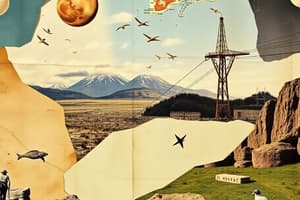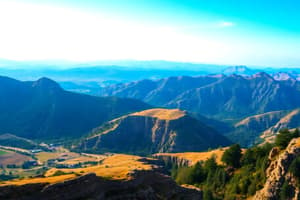Podcast
Questions and Answers
Which branch of geography focuses on natural features such as landforms and climate?
Which branch of geography focuses on natural features such as landforms and climate?
- Economic Geography
- Physical Geography (correct)
- Cultural Geography
- Human Geography
Which climate zone is characterized by warm and humid conditions with high biodiversity?
Which climate zone is characterized by warm and humid conditions with high biodiversity?
- Dry
- Polar
- Temperate
- Tropical (correct)
What is the term for the unique characteristics that make a location distinct?
What is the term for the unique characteristics that make a location distinct?
- Location
- Place (correct)
- Region
- Movement
What does the term 'human-environment interaction' refer to?
What does the term 'human-environment interaction' refer to?
Which of the following is NOT a major physical feature of the Earth?
Which of the following is NOT a major physical feature of the Earth?
Which term describes an area defined by specific unifying characteristics?
Which term describes an area defined by specific unifying characteristics?
What does cartography primarily involve?
What does cartography primarily involve?
Which of the following factors does not impact population distribution?
Which of the following factors does not impact population distribution?
Which oceans are part of the Earth's major geographical features?
Which oceans are part of the Earth's major geographical features?
Which aspect of geography examines how people, goods, and ideas move from one place to another?
Which aspect of geography examines how people, goods, and ideas move from one place to another?
Flashcards are hidden until you start studying
Study Notes
Geography
-
Definition: Geography is the study of places, the relationships between people and their environments, and the spatial organization of human activities.
-
Branches of Geography:
- Physical Geography: Focuses on natural features (landforms, climate, vegetation).
- Human Geography: Examines human activities, cultures, economies, and their spatial relationships.
-
Key Concepts:
- Location: The position of a place on the Earth's surface (absolute vs. relative).
- Place: The characteristics that make a location unique (cultural, physical).
- Region: An area defined by certain unifying characteristics (cultural, political, physical).
- Movement: How and why people, goods, and ideas move from one place to another.
- Human-Environment Interaction: The ways humans adapt to and modify their environment.
-
Major Physical Features:
- Continents: Asia, Africa, North America, South America, Antarctica, Europe, Australia.
- Oceans: Pacific, Atlantic, Indian, Southern, Arctic.
- Mountain Ranges: Himalayas, Andes, Rockies, Alps.
- Rivers: Nile, Amazon, Yangtze, Mississippi.
-
Climate Zones:
- Tropical: Warm, humid; high biodiversity.
- Dry: Arid and semi-arid; deserts and steppes.
- Temperate: Moderate temperatures; distinct seasons.
- Polar: Cold; tundra and ice caps.
-
Population Distribution:
- Urban vs. Rural: Increasing urbanization; major cities and their influences.
- Demographics: Age, gender, ethnicity, and migration patterns.
-
Cartography:
- Maps: Tools for representing geographical information; types include physical, political, thematic.
- Scale and Projection: Methods to represent the three-dimensional Earth on two-dimensional surfaces.
-
Geopolitics:
- Borders and Territories: Political boundaries and their implications.
- Global Issues: Climate change, resource distribution, environmental challenges.
-
Cultural Geography:
- Languages: Distribution and impact of languages on culture and identity.
- Religions: Major world religions and their geographical distribution.
- Economic Activities: Agriculture, industry, services, and their spatial implications.
Definition of Geography
- Study of places, human-environment relationships, and the spatial organization of activities.
Branches of Geography
- Physical Geography: Analyzes natural features including landforms, climate, and vegetation.
- Human Geography: Investigates human activities, cultures, and economies along with their spatial interactions.
Key Concepts in Geography
- Location: Defined through absolute (exact coordinates) and relative (comparison to other places) positions.
- Place: Unique characteristics of a location that encompass both cultural and physical attributes.
- Region: An area distinguished by shared characteristics, can be cultural, political, or physical.
- Movement: Examines how people, goods, and ideas circulate across spaces.
- Human-Environment Interaction: Explores how humans adapt to and alter their surroundings.
Major Physical Features
- Continents: Asia, Africa, North America, South America, Antarctica, Europe, Australia.
- Oceans: Major bodies include the Pacific, Atlantic, Indian, Southern, and Arctic Oceans.
- Mountain Ranges: Notable ranges include the Himalayas, Andes, Rockies, and Alps.
- Rivers: Significant rivers include the Nile, Amazon, Yangtze, and Mississippi.
Climate Zones
- Tropical: Characterized by warm, humid conditions and high biodiversity.
- Dry: Includes arid deserts and semi-arid steppes.
- Temperate: Features moderate temperatures with distinct seasonal changes.
- Polar: Known for cold climates, tundra, and ice caps.
Population Distribution
- Urban vs. Rural: Rapid urbanization trends and the influence of major cities on their surroundings.
- Demographics: Focus on age, gender, ethnicity, and migration patterns influencing population distribution.
Cartography
- Maps: Essential for representing geographical information; includes physical, political, and thematic maps.
- Scale and Projection: Techniques to depict the three-dimensional Earth on two-dimensional formats.
Geopolitics
- Borders and Territories: Importance of political boundaries and their social implications.
- Global Issues: Challenges such as climate change, resource allocation, and environmental concerns.
Cultural Geography
- Languages: The influence of language distribution on culture and identity.
- Religions: Analysis of major world religions and their geographical spread.
- Economic Activities: Overview of agriculture, industry, and services, and their geographical impacts.
Studying That Suits You
Use AI to generate personalized quizzes and flashcards to suit your learning preferences.




